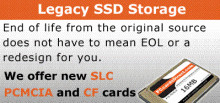The State of Chip Manufacturing and Its Effect on the Solid State Storage Industry
Introduction
The chip manufacturing industry is a cornerstone of modern technology, driving advancements in various sectors, from consumer electronics to data centers. Solid state storage, primarily represented by Solid State Drives (SSDs), has seen significant growth in recent years, largely fueled by innovations and developments in chip manufacturing.
Current State of Chip Manufacturing
Technological Advancements:
Chip manufacturing has seen rapid advancements, particularly in process technology. The industry is now working on sub-5nm process nodes, with companies like TSMC, Samsung, and Intel leading the charge. These advanced nodes allow for higher transistor densities, leading to more powerful and efficient chips. This progress is crucial for the SSD industry, which relies on these advancements to enhance performance and storage capacities.
Materials and Techniques:
New materials and fabrication techniques are being explored to overcome the limitations of silicon-based chips. For example, the use of extreme ultraviolet (EUV) lithography has become more prevalent, allowing for more precise and efficient chip designs. Additionally, the integration of new materials such as gallium nitride (GaN) and silicon carbide (SiC) is being investigated to improve chip performance and energy efficiency.
Economic and Geopolitical Factors:
The chip manufacturing industry is highly globalized, with supply chains spanning multiple countries. However, recent geopolitical tensions, particularly between the US and China, have led to significant disruptions. Trade restrictions and tariffs have impacted the supply of critical components and materials, leading to increased costs and delays in production.
Challenges in Chip Manufacturing
Supply Chain Disruptions:
The COVID-19 pandemic exposed the fragility of global supply chains. Lockdowns and restrictions led to factory shutdowns and delays in production, causing a global semiconductor shortage. This shortage affected various industries, including automotive, consumer electronics, and notably, the SSD market.
Technological Hurdles:
As chip manufacturing approaches the physical limits of silicon, new challenges arise. Scaling down to smaller nodes increases manufacturing complexity and costs. Issues like heat dissipation and quantum tunneling become more pronounced, necessitating new engineering solutions.
Environmental Impact:
Chip manufacturing is resource-intensive, consuming vast amounts of water and energy. As the industry grows, so does its environmental footprint. There is increasing pressure on manufacturers to adopt sustainable practices and reduce their ecological impact.
Impact on the Solid State Storage Industry
Performance and Capacity Improvements:
Advancements in chip manufacturing directly translate to better SSD performance and higher capacities. The transition to NAND flash memory with more layers (3D NAND) has been pivotal. Current technologies allow for over 150 layers, significantly increasing storage density. Furthermore, new controller technologies and interface improvements (e.g., PCIe 4.0 and 5.0) have enhanced data transfer speeds and reduced latency.
Cost Reduction:
While initial production costs for advanced chips are high, economies of scale and process optimizations eventually lead to cost reductions. Lower manufacturing costs for NAND flash memory and controllers have made SSDs more affordable. This has resulted in a significant drop in per-gigabyte costs, making SSDs more accessible to consumers and businesses alike.
Increased Adoption in Data Centers:
Data centers have been among the primary beneficiaries of advancements in chip manufacturing. The need for high-speed, high-capacity storage solutions is paramount in handling big data, artificial intelligence, and cloud computing workloads. Modern SSDs, powered by advanced chips, offer the necessary performance and reliability. The transition from traditional hard drives (HDDs) to SSDs in data centers has accelerated, driven by these technological improvements.
Innovation in Form Factors:
The development of new chip technologies has also spurred innovation in SSD form factors. The M.2 and U.2 form factors, for instance, have become standard in various applications due to their compact size and superior performance compared to traditional 2.5-inch drives. Additionally, the advent of NVMe (Non-Volatile Memory Express) over Fabrics (NVMe-oF) has enabled new storage architectures, improving scalability and flexibility in enterprise environments.
Challenges and Limitations:
Despite these advancements, the SSD industry faces its own set of challenges. The ongoing semiconductor shortage has led to supply constraints and increased prices for SSDs. Additionally, as storage capacities increase, maintaining data integrity and reliability becomes more challenging. Advanced error correction techniques and improved firmware are essential to address these issues.
Future Prospects:
The future of SSDs looks promising, with several emerging technologies on the horizon. 3D XPoint memory, developed by Intel and Micron, offers non-volatile memory with performance characteristics closer to DRAM. Similarly, the potential of Quantum Dot Cellular Automata (QCA) and other post-silicon technologies could revolutionize the industry. As chip manufacturing continues to evolve, we can expect further enhancements in SSD performance, capacity, and cost-efficiency.
Conclusion
The state of chip manufacturing profoundly influences the solid state storage industry. Technological advancements in chip fabrication have enabled significant improvements in SSD performance and capacity, driving their widespread adoption in both consumer and enterprise markets. However, challenges such as supply chain disruptions, technological hurdles, and environmental impacts persist. Despite these challenges, the future of SSDs remains bright, with continuous innovations in chip manufacturing promising even greater advancements in storage technology.
The symbiotic relationship between chip manufacturing and the SSD industry underscores the importance of ongoing research and development. As the digital world continues to expand, the demand for high-performance, reliable, and affordable storage solutions will only grow, making the advancements in chip manufacturing all the more critical.

Recent Comments
Archives
Categories
Meta
Search Menu
Recent Posts
Categories